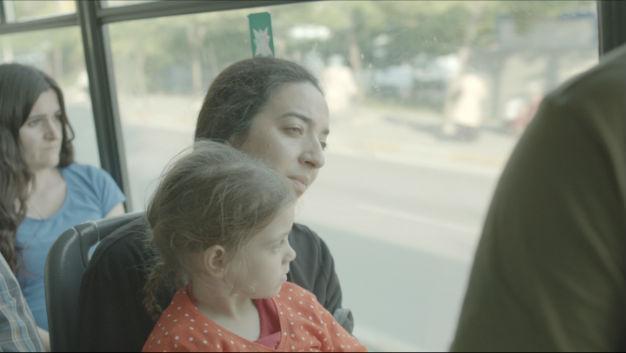‘Dust Cloth’: Cleaning women on the verge of a nervous breakdown
Emrah Güler

When “Toz Bezi” (Dust Cloth) won the Golden Tulip for Best Film in the national competition of the recent Istanbul International Film Festival, director and writer Ahu Öztürk dedicated her award to the mothers and women of a Turkey that finds itself war-torn once more. “The wars hit women and children first, and it will be women who will build peace,” Öztürk said in her acceptance speech.
Peace and conflict take different forms in Öztürk’s debut feature that also won best script and best actress awards at the festival. The dust cloth in the title is the symbol of a social dynamic that is definitive of both class differences in big cities and women’s status on many levels. The dust cloth here is the one cleaning women, domestic workers, or simply “women,” as referred to in Turkish, from the slums use to clean the houses of urban, more privileged women.
At the center of the story are two cleaning women who silently commute from Istanbul’s slums, or as Öztürk described it in an interview, “the bowels of the city,” to better parts of the city. Hatun (Nazan Kesal) is the older, smarter and more ambitious of the two, while Nesrin (Asiye Dinçsoy) is vulnerable to the power dynamics of a city that is almost a battlefield for her.
The two live in the same building, Hatun with her waiter husband and troubled teen son, and Nesrin with her 5-year-old daughter Asmin, her husband having recently gone AWOL. The two women sometimes go through the endless routine of commuting together, sharing their dinners at Hatun’s house to the occasional bickering of the older woman and her husband, while spending the most valuable times of the day on Hatun’s small balcony, gossiping over tea and cigarettes.
At first glance, Hatun is a survivor, standing up to her husband, advising the younger Nesrin and believing that she will eventually be able to afford a house in one of the upper-middle class districts of Istanbul where she goes to clean. Nesrin is vulnerable and unable to cope with a life on the edges without her husband – something that is not necessarily a romantic disappointment for her but stemming more from the loss of a life partner and financial helper.
The big city and its failed inhabitants
The two spend their days in different houses, interacting with different women from the better parts of the city. The relationship between the women and the employers are civilized, but not necessarily warm or genuine. The middle-class women are polite to their cleaners, inviting them to their tables and sometimes listening to their concerns. That is, until they are asked for a raise or when they need to follow up on a full-time job they themselves offered to their employees.
The employers might be on the other side of the economic cycle, but the more we get to see them, the more we realize that they present a whole different set of prototypes, however glorified they seem at first. Nesrin’s employer is a modern working woman whose house is a replica of an Ikea catalogue but who is lonely in her day-to-day routine. Hatun’s employer is an older lady from old Istanbul who is polite but ruthless and petty.
Raising children and the relationship with parents are major themes of “Toz Bezi.” Hatun’s struggle to connect with her son and Nesrin’s struggle with her new-found identity as a single mother are other obstacles to be negotiated. As for the urban women, one of them is consumed by a sick father, while the other is not on the best of terms with her daughter. The burden of parenting and being children are constantly presented and are occasionally portrayed as yet other battles to fight.
“Toz Bezi,” at its core, is about how a big city can swallow its inhabitants, and how it can be much harder on them if they are women, regardless of their class, age or marital status. There is no glamour in Öztürk’s Istanbul. It’s not an exotic or inspiring city. The houses, the buses and the roads are all locations that feel claustrophobic even in the sunshine. The occasional ray of hope is devoured by a city that is not welcoming or protective, especially for its women.
 When “Toz Bezi” (Dust Cloth) won the Golden Tulip for Best Film in the national competition of the recent Istanbul International Film Festival, director and writer Ahu Öztürk dedicated her award to the mothers and women of a Turkey that finds itself war-torn once more. “The wars hit women and children first, and it will be women who will build peace,” Öztürk said in her acceptance speech.
When “Toz Bezi” (Dust Cloth) won the Golden Tulip for Best Film in the national competition of the recent Istanbul International Film Festival, director and writer Ahu Öztürk dedicated her award to the mothers and women of a Turkey that finds itself war-torn once more. “The wars hit women and children first, and it will be women who will build peace,” Öztürk said in her acceptance speech.